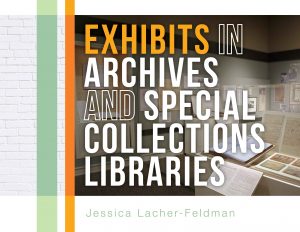
by Natalia Gutierrez-Jones
I recently had the opportunity to speak with Jessica Lacher-Feldman, who is the Assistant Dean of Rochester University, as well as the Director of Rare Books, Special Collections and Preservation. Jessica discovered her affinity for archives during her undergraduate education at University at Albany, SUNY, when she began working at the New York State Museum, which also held a library and archives. At this point she had not thought about pursuing library science, and had been focused on her education in history. Through both graduate classes while obtaining her first masters in history, and the influence of archivists and museum professionals at her job, she began to see the appealing connections between history and library work. Particular outreach events at the NY State Museum, such as ‘camp-ins’ for schoolchildren, made her more passionate about the positive effect of engaging with cultural heritage, and exhibits in particular – a focus that has been central in her career.
Jessica’s current position as both Assistant Dean and Director of Rare Books, Special Collections and Preservation requires her to balance the grounded work that must be accomplished in the archives with the need to act in the interest of all of the universities libraries as part of her broader role. At her previous job at LSU, Jessica had the responsibilities of Assistant Dean without the formal position, and she has found it helpful to have the official title in her leadership. The balancing act of Jessica’s two roles will be eased in future months as the library hires two new curators and creates a new outreach position for Special Collections. Her average day starts early, arriving at her office around 7 am to have some time to herself before a day full of meetings with the dean, assistant directors, staff she supervises, regarding collection development, exhibits, projects, and grants. On top of that, she spends time keeping up with email communications, particularly with existing and potential donors. Recently her evenings have involved background reading for a class she taught at the University, and preparing for a TED Talk style presentation about her work in archives. Writing articles and working on another book project also occupy her time outside of official work hours.
Her outreach and advocacy work involves myriad tasks, including applying for grants, connecting with donors, and planning and producing exhibits. She tries to intervene in the more traditional programming and give a new approach to involve the whole community and get people excited; a recent project involved yarn bombing! She finds experimentation, creativity, and a mixture of branding and surprises to be the best approach to public programming. Jessica also tries to bring in outside institutions, such as the allied community organizations Historic Brighton and the Susan B. Anthony Museum & House.
Jessica’s passionate approach to outreach and advocacy means that she is constantly representing her profession, and constantly working. She finds archives essential to democratic societies, and wants her colleagues in archives to understand that outreach and advocacy are not a separate, extra component of the work, but a fundamental part. She hopes to convey her energy and commitment to those involved in outreach projects so that they also feel fully engaged in the work and the successful outcome. Jessica also would like to see more artists in the archives, bringing the documents to life through performing or visual arts. She sees these projects as important opportunities to emphasize the success of output fueled by research in the archives.
One challenge Jessica sees for outreach and advocacy work is, as she puts it, “bandwidth.” Staff can become stretched thin with responsibilities and Jessica wants to ensure outreach is appropriately prioritized. She sees this challenge also as an opportunity to shift our philosophy to encompass advancement through outreach. When she needs help with a project, she will engage community members who specialize in the area that needs support. She sees this asking as creating a connection and in a sense, deputizing a community member who will thereafter feel like a part of the archives’ success. Another challenge Jessica has faced is working with donors and collections that were controversial, and having to negotiate with senior administration as to how much publicity and community involvement these collections should receive. Jessica believes archivists have a responsibility to be willing to work with a collection regardless of personal feelings towards the materials. Tension can also arise in her position due to competing priorities as to the target audience of the archives. There needs to be an institutional focus to support faculty, but also collection policies that appeal to external and international researchers and bring in a varied audience.
Jessica has written a book on archival exhibitions (Exhibits in Archives and Special Collections Libraries, 2013) and this form of public programming is important to her. She sees exhibits as a foundation for any way that we approach outreach and advocacy, as they can create a narrative or platform that can be built off of in various ways. Exhibits can ground our message in the actual materials. They give us an opportunity to formulate what we need to say and to consider who our audience is ahead of time. Furthermore, they have value in that there is a lasting component to exhibits, and evidence that becomes preservable, especially in the case of digital exhibits. Jessica’s powerful work ethic and passion for cultural heritage make her an ideal advocate for archives.

